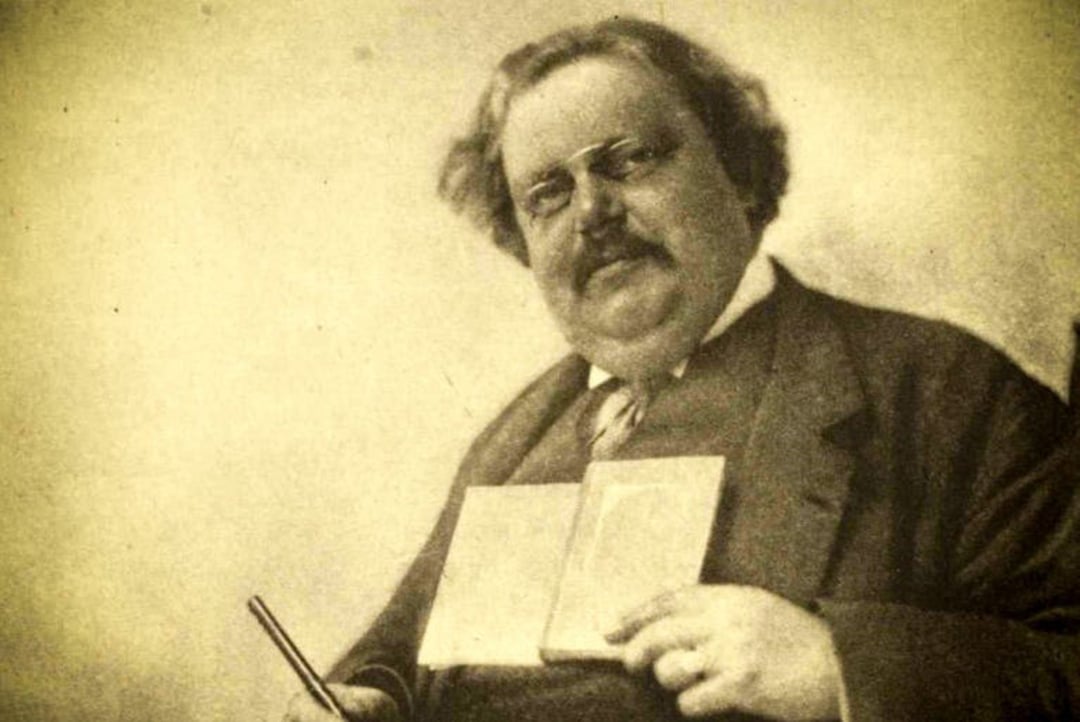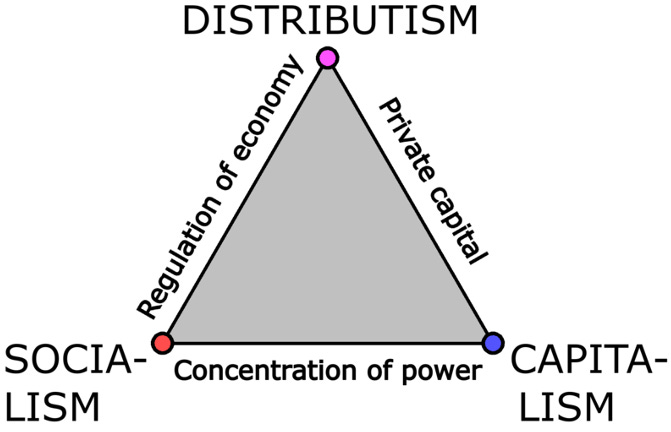

Chesterton Against Servility
by W.D. James | Nov 24, 2023
Outright opposition to modernity is often dismissed as backward-looking or “reactionary” and associated with a rigidly hierarchical or aristocratic outlook. But there is another tradition of resistance to the modern world that has very different ideals and can serve as the basis of an old-new radical philosophy of natural and cosmic belonging, inspiring humanity to step away from the nightmare transhumanist slave-world into which we are today being herded. In this important series of ten essays, our contributor W.D. James, who teaches philosophy in Kentucky, USA, explores the roots and thinking of what he terms “egalitarian anti-modernism”. (Paul Cudenec’s preface to the series on Winter Oak).
And Daddy, won’t you take me back to Muhlenberg County?
Down by the Green River where Paradise lay
Well, I’m sorry, my son, but you’re too late in asking
Mister Peabody’s coal train has hauled it away
– John Prine, Paradise
In this essay we’ll take up G.K. Chesterton’s writing on ‘distributism.’ Distributism is an economic theory that has enjoyed minimal real-world application, but is quite interesting. By way of background, we need to keep in mind Pope Leo XIII’s encyclical Rerum Novarum (‘The New Things’; 1891). Leo was the Pope who first named ‘Modernism’ as a heresy and an evil. In Rerum he declared war on socialism and capitalism. On his view, neither sought the ‘common good’ and both were dehumanizing. He defends private property along the lines of a natural right to enjoy the fruits of one’s labor. However, private property should be used to promote the common good and state regulation is expressly sanctioned. He also promotes the formation of labor unions and the right to a living wage. Further, it also contains the seeds of the ethical idea of the ‘preferential option for the poor.’
While he pointed to what some concrete measures might be to mitigate contemporary social evils, he is frustratingly vague on outlining an overall vision of a just society (of providing an ‘ism’ to contrast to socialism and capitalism). Distributism is way of fleshing out what a humane contemporary economic theory might look like once we reject the modern alternatives.i
Property, for me and for you

“The Servile State in Culture means imposed artificiality, transient fashions, Hollywood and pop icons.
The Distributist State in Culture means meritocracy, real art, folk music, serious literature and good beer”.ii
Can I have an ‘Amen’ for folk music and good beer? The modern project, whether in traditional ‘right’ or ‘left’ modes, culminates in servility on his view. Both are characterized by the same modern evils of bigness, complexity, lack of respect for the individual person, and disenfranchise the vast majority of the population.
Chesterton opens this work with an attack on capitalism. He observes, “Capitalism is a very unpleasant word. It is also a very unpleasant thing.”iii The problem with capitalism is that “The practical tendency of all trade and business today is towards big commercial combinations, often more imperial, more impersonal, more international than many a communist commonwealth….”iv He goes on to define ‘capitalism’ thus:
That economic condition in which there is a class of capitalists, roughly recognizable and relatively small, in whose possession so much of the capital is concentrated as to necessitate a very large majority of the citizens serving those capitalists for a wage.v
The irony of capitalism is that while it is built on respect for private property, its own mechanisms end up reducing the majority of people to proletarians—those without private property.

He next sets about attacking socialism. Socialism, on Chesterton’s understanding, is “a system which makes the corporate unity of society responsible for all its economic processes….”vi Since it combines both economic and political power in the hands of the same people (the state), it does not tolerate any opposition to its dictates. This means, in terms of justice, “putting all one’s eggs in the same basket.” Chesterton wants to see lots of competing organizations in society, not centralization. And, he wants to see them being built from the bottom up as much as possible, not imposed top down.
The problem with both capitalism and socialism is the same problem: both abolish small private property. For Chesterton, ever the proponent of liberty for the little guy, “Opposition and rebellion depend on property and liberty.”vii In the modern world anyway, “The critic of the State can only exist where a religious sense of right protects his claims to his own bow and spear; or at least, to his own pen and printing press.”viii He holds that the true contrary to “property” is “prostitution”; either one has property and a large degree of self-sufficiency or else one must sell oneself.

Chesterton goes on to defend the radically egalitarian distribution of private property. This is the essence of distributism. Human beings, to be human, to be ‘sane’, must be able to determine their own fate. This can only, realistically, be accomplished if they possess the economic means of remaining independent. That means private property (contra socialism) widely distributed (contra capitalism). How might we achieve this?
We can summarize some of the basic tenants of distributist economics along these lines:
- Property: Breaking up of large corporations and cartels. Encouragement of the development of small holdings (small-scale agriculture; cottage industries). Both in the name of removing on the one hand, and supporting on the other, the material basis of freedom. To the extent that larger scale organizations are necessary, organizing them along cooperative lines.ix
- Industrialization: Drastically limiting the use of industrial technologies because they inevitably lead to large-scale manufacture.
- Finance: Advocacy of moral restraints on the market. Just wages, just prices, rent controls; things along those lines.
- Guilds: Reinstituting guilds to self-regulate the various industries and crafts. Labor unions where there are still elements of capitalist production.
- The State: Acceptance that the state will have certain necessary functions to perform for the foreseeable future. However, following the principle of ‘subsidiarity,’x the state should govern much less in a top-down fashion and much more in a bottom-up fashion by encouraging voluntary associations to carry out community tasks as much as possible.

We get a vision of a society of largely self-sufficient producers in a highly regulated economy (just wages, just prices). Chesterton had rightly deduced that the average person only felt free while at home. Where can the average working person exercise any creativity and freedom? Not in their rented flat. Not in the public housing project. Certainly not on the job. Only in a house they can call their own, paint pink if they wish and on whose little plot of land they can grow some flowers and vegetables, to suit their taste and proclivity. The distributists sought to provide a material basis for maximizing the realm of liberty. This manifested itself in George W. Bush’s idea of the ‘ownership society’, though, sadly, not so much in his policies.
The worst of all possible worlds
Our current overlords propose that ‘you will own nothing and you will be happy.’ When they say ‘you will own nothing,’ they mean neither privately nor publicly. The proposal is that the global oligarchs will own everything and they will just ‘take care of us’. This might be via automated deliveries in their ‘smart cities’ or via a ‘guaranteed basic income.’ I used to be interested in this latter idea. However, it is becoming clear that this is meant as a means of merely sustaining the lot of us once we are rendered useless by the full implementation of artificial intelligence and automation. Lab-grown meat, Hollywood, video games, pornography, and sexbots for everyone!
I might be interested in owning some of my own property. I might even be interested in having proportionate ownership in some collective property, democratically managed. What about all ownership in a very few hands? How long do we suppose the ‘useful’ will provide, gratis, our sexbots, not to mention food and shelter, for those rendered useless? I wouldn’t bet on it being for long. The useless, are, unfortunately, useless. But what to do about that? It seems like we have three basic options before us: (1) let the technological capital remain privately held in a few hands and pray for the largess and charity of that class (the direction we are currently heading in); (2) expropriate the technological capital from private hands and administer it publicly (the promise of endless leisure while all the technology does the work; the threat of an ever more effective Leviathan); or, (3) very intentionally place limits on the displacement of humans by technology (but that will still require some overarching authority to impose that scheme). Not a lot of good options. Distributism is a theory of how you might choose option 3.

Home ownership is decreasing throughout the Western world. There are outright housing crises in many countries. Who could claim to be economically self-sufficient on their own means? Participation in some collective ownership of the means of production is off the table. Even contemporary ‘socialists’ don’t venture such a bold proposal as seizing the means of production. No more ‘expropriating the expropriators.’ Socialism is apparently reduced to virtue signaling, bogus ‘green’ proposals to enlarge governmental bureaucracies, and making Starbucks baristas feel included and valued (not valued in the sense of paying them a decent wage, just ‘affirmed’).
Some sort of collective decision-making seems essential. ‘Let alone’ governance means, as Chesterton and others deduced, monopoly and oligarchy and increasingly extensive automation. Complete collectivization means totalitarian communism. There must be some middle ground of public decision making and private enjoyment. Distributism provides one way of thinking about this. Give me liberty or give me sexbots!
You can’t get there from here
My dad, long before the time of Google Maps, used to like telling a humorous tale of a stranger who stopped by asking ‘how do you get to such and such a place,’ and the wizened local responding, ‘you can’t get there from here.’
Unfortunately, we have come to a place civilizationally where none of the places it is easy to get to are very appealing. And maybe you really can’t get to a good place from here. Chesterton wants to insist that no matter how hard or unlikely it might be for us to reestablish a decent human society, it is possible, if very difficult, to get there from here. That hope might be the hope we most need to cultivate. Thinking about politics has gotten interesting again and the consequences seem momentous. The times are calling again, as they did in Chesterton’s day, for “impractical” thinkers.

Subscribe to Philosopher’s Holler
References:
i ‘Corporatism’ would be the main other concrete theory developed out of this strand of thought. This formed the basis of the various Christian Democratic parties in Europe in the mid-twentieth century. ‘Liberation theology’ might be a third, but was criticized by Popes John Paul II and Benedict XVI.
ii G.K. Chesterton, The Outline of Sanity, IHS Press, 2001, p. 21.
iii Ibid, p. 26.
iv ibid, p. 26.
v Ibid, p. 27.
vi Ibid, p. 28.
vii Ibid, p. 29.
viii Ibid, p. 29.
ix An example of a business organized along distributist lines is the Mondragon Corporation in Spain (it is in the top ten Spanish corporations): Introduction, MONDRAGON Corporation | MONDRAGON Corporation (mondragon-corporation.com)
x The idea that human societies naturally have a variety of levels of association, from the family up through community and neighborhood associations to the state. Further, the idea that the social institutions further up that scale will tend to try to replace or usurp the function of the associations below them and that this is illegitimate.
This essay was first published on WinterOak


0 Comments